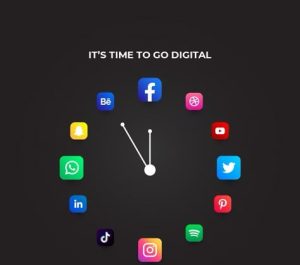Introduction
In the fast-evolving world of online business, digital marketing and affiliate marketing are two powerful strategies that often confuse beginners. While both are used to promote products or services online, their methods, goals, and earning potential are quite different.
This blog will help you understand the key differences between digital marketing and affiliate marketing, their advantages, and which one is suitable for your career or business.
What is Digital Marketing?

Definition
Digital Marketing is a broad term that covers all types of online marketing efforts. It involves using digital platforms like search engines, social media, email, websites, and paid ads to promote a business or brand.
Main Goal
To increase brand visibility, generate leads, boost conversions, and ultimately drive revenue.
Key Components of Digital Marketing
1. Search Engine Optimization (SEO)
Improving website visibility on Google to get organic (free) traffic.
2. Social Media Marketing (SMM)
Using platforms like Facebook, Instagram, and LinkedIn to promote a brand and connect with audiences.
3. Content Marketing
Creating valuable content (blogs, videos, infographics) to engage and educate the audience.
4. Email Marketing
Sending personalized emails to nurture leads and promote services/products.
5. Pay-Per-Click Advertising (PPC)
Running paid ads on Google, Facebook, or YouTube to quickly reach potential customers.
6. Web Analytics
Tracking campaign performance through tools like Google Analytics to make data-driven decisions.
What is Affiliate Marketing?

Definition
Affiliate Marketing is a type of performance-based marketing where you earn a commission by promoting other people’s or companies’ products.
You don’t own the product, you simply refer others using a special link. If someone makes a purchase through your link, you earn a part of the sale.
Main Goal
To generate sales for another company and earn a commission for each successful sale, lead, or action.
Key Elements of Affiliate Marketing
1. Affiliate (You)
The person promoting the product/service through a unique affiliate link.
2. Merchant (Product Owner)
The company or individual whose product is being promoted.
3. Affiliate Network (Optional)
A platform like Amazon Associates, ClickBank, or ShareASale that connects affiliates with merchants.
4. Customers
The end-users who buy the product through the affiliate’s link.
Which One Should You Choose?
Choose Digital Marketing If…
-
You want to build a career in marketing or advertising.
-
You’re running a business or want to start one.
-
You love working with different tools like Canva, Google Ads, or Meta Business Suite.
-
You want a full-time job or freelancing projects.
Choose Affiliate Marketing If…
-
You want passive income from home.
-
You have a blog, YouTube channel, or social media audience.
-
You enjoy writing content, reviews, or making videos.
-
You want to promote products without handling customer service.
Can Digital Marketing and Affiliate Marketing Work Together?
Many successful affiliate marketers use digital marketing strategies like SEO, content marketing, and email marketing to boost their affiliate income. In fact, learning digital marketing gives you a strong advantage if you plan to do affiliate marketing professionally.
Pro Tip: Learn Digital Marketing first, then use it to become a better affiliate marketer.
Final Thoughts
Both digital marketing and affiliate marketing are booming in 2025. If you’re a student, job seeker, or business owner, learning these skills can open multiple career and earning opportunities.
If you’re serious about learning with practical training, live projects, and internship support, consider joining a trusted institute.
Learn from the Best – Gourav Digital Club
At Gourav Digital Club, we offer:
-
100% practical digital marketing training
-
1-month internship with real-time projects
-
Lifetime support & mentorship
-
Job assistance + Freelancing guidance
-
Small batch size (10-12 students only)
start your digital journey with confidence!
Leave a Reply